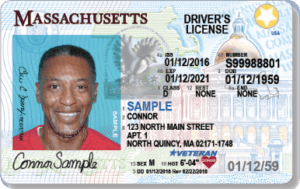Real concerns about Real ID
 In February 2018, I wrote about Real ID. That is a change in the way the Registry of Motor Vehicles processes our State IDs and driver’s licenses, so that they comply with Federal Standards.
In February 2018, I wrote about Real ID. That is a change in the way the Registry of Motor Vehicles processes our State IDs and driver’s licenses, so that they comply with Federal Standards.
Federal IDs are now marked differently. They require proof of citizenship or immigration status. The Massachusetts State IDs did not include citizenship information until 2018. As of October 2020, the Massachusetts state ID or driver’s license will no longer be valid as ID for boarding a plane in America unless it has been upgraded to include citizenship information; the new ID is called “Real ID.”
For immigrants, their Real IDs or driver’s licenses will expire when their visa or resident permit expires.
When I wrote about this a year ago, I was concerned about how immigration information on our Real IDs could hurt immigrants. I was also concerned about people who change their names or genders, who would be compelled to supply a birth certificate in order to get a new driver’s license or state ID.
There is much more to be concerned about now.
Apparently, the Massachusetts Department of Transportation has been sharing photos and information with the FBI and ICE. This is not some Trump-era tactic. It’s been going on for thirteen years.
The MassDOT has been sharing its database of photographs from state-issued IDs to government agencies for the past 13 years. The Mass ACLU alleges that this unregulated practice violates First and Fourth Amendment freedoms, including the right to “maintain a legitimate expectation of privacy.” [source]
Our modern age makes us vulnerable to misuse of our personal information. There’s a lack of privacy, if government agencies share our data without our knowledge.
Facial recognition software
 Now the State of Massachusetts is looking into how our Registry of Motor Vehicles information can be protected. Kade Crockford, the program director of the ACLU’s Technology for Liberty Project, is also concerned with the increasing use of facial recognition software. Coincidentally, the city of Somerville has just taken a stand against facial recognition software.
Now the State of Massachusetts is looking into how our Registry of Motor Vehicles information can be protected. Kade Crockford, the program director of the ACLU’s Technology for Liberty Project, is also concerned with the increasing use of facial recognition software. Coincidentally, the city of Somerville has just taken a stand against facial recognition software.
“We have significant concerns that people’s safety may be in jeopardy as a result of the unregulated use of this [facial recognition software] technology,” Crockford said. “We have no guarantees that this system is not being abused. … It’s possible that a law enforcement official could find a picture of somebody on Instagram they think is cute and send that image to the RMV and ask for the RMV to give them that person’s name and address. We just have no idea.” [source]
This all feels very Minority Report. (If you’ve never seen this dystopic movie, consider watching it this summer).